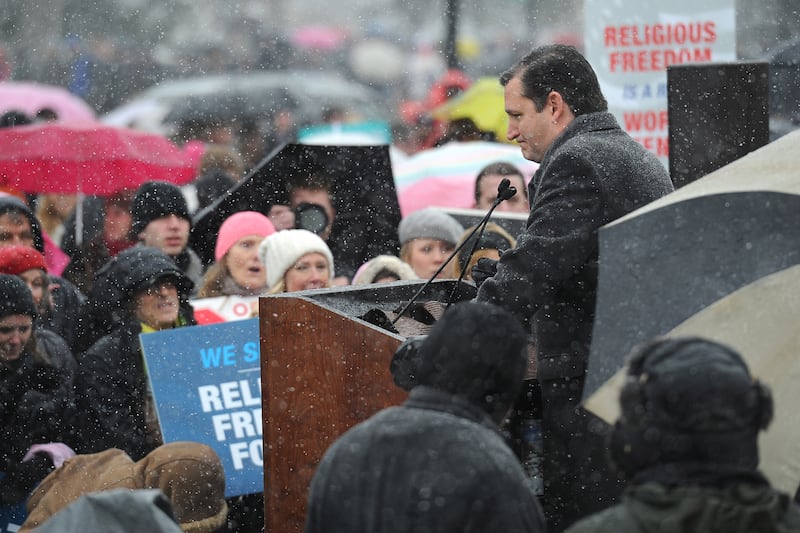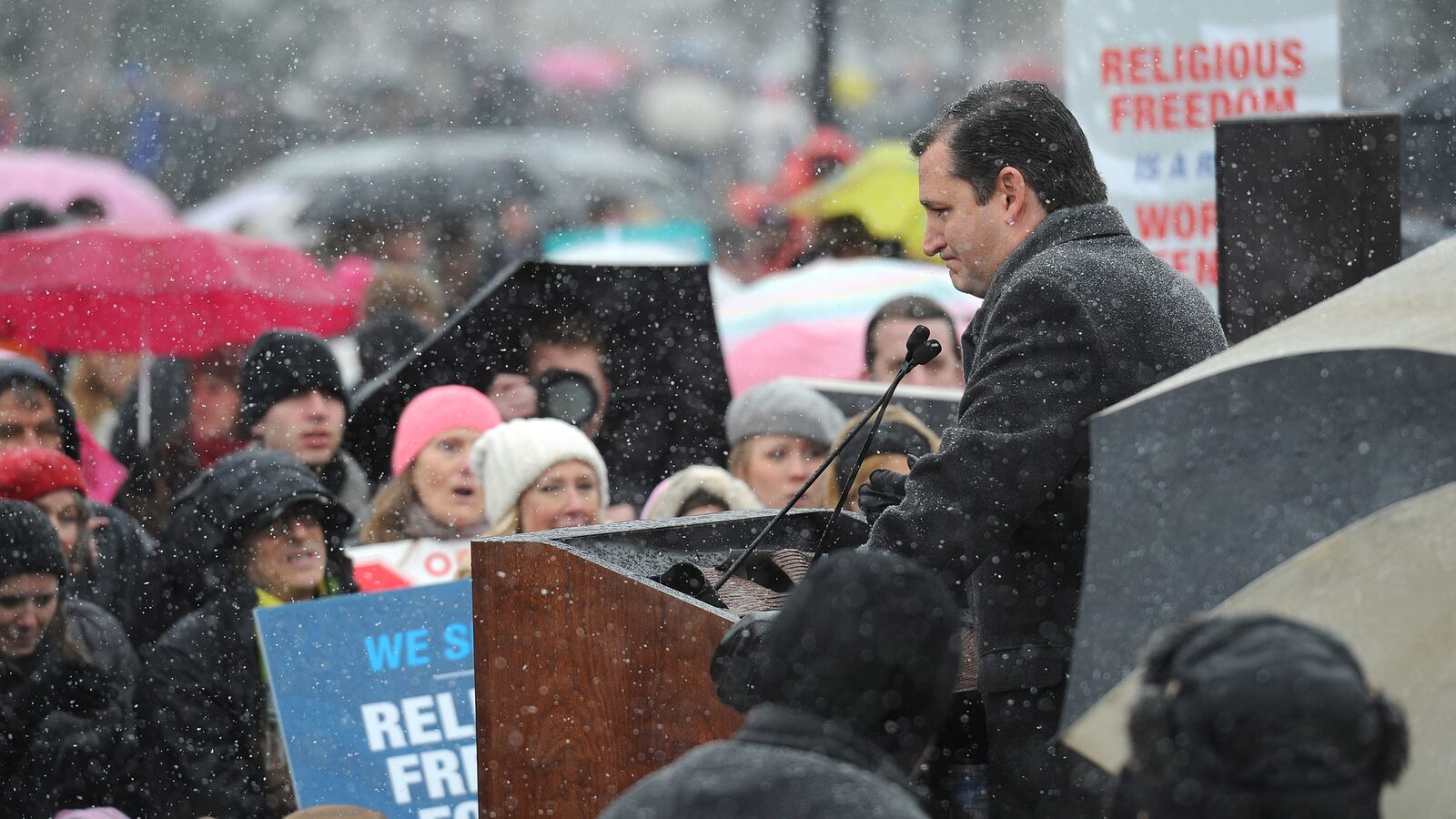If you haven’t done so yet, I urge you to take three minutes here with me to reflect on this unusually revealing week. Three big developments—the Obamacare enrollment deadline, the Paul Ryan budget, and the Supreme Court’s McCutcheon decision—return us to first principles, so to speak; remind us of what our two parties (and the philosophical positions behind them) are really and truly about. And they remind me, at least, of why the Republican Party, on a very basic level, can’t ever be truthful with the American people about what matters to it most at the end of the day.

So what is it that matters most to the Republican Party? A lot of things do, and for different Republicans, the answer will be different: abhorrence of abortion, disgust at social relativism, hatred of big government. These things matter. But they don’t, in my view, matter most. What matters most, especially to elected Republicans in Washington (that is, more so than the rank-and-file), is this: Protect the well-off from redistribution of their wealth to those who don’t deserve it.
On what basis do I make this claim? Well, I’ve been watching Republicans on Capitol Hill pretty closely for many years now. There are, Lord knows, a number of topics on which they are not exactly what you’d call amenable to compromise. The climate-change denialism, the constant attempts to chop away at reproductive rights (which are constitutional rights), et cetera.
But I think it’s fair and accurate to say that, especially in the Obama era, two issues have obsessed the party more than all the others: opposition to tax increases, especially on the wealthy; and a zeal for cutting the budget, which really means cutting domestic spending programs.
In other words—protect the rich, and injure the poor. These are the points on which they’ve fought tooth and nail. After all, think about this: They could have had a major concession from Obama on entitlements (chained CPI) if they’d been willing to allow an income-tax increase on dollars earned above $250,000. But even that couldn’t reel them in. It’s true they did allow an increase on dollars earned above $450,000 (for families) in the fiscal-cliff deal, but their backs were really against the wall on that one: They relented to that small increase only because the country was hours away from a major tax increase (the expiration of the Bush tax cuts), and it was clear to everyone that the Republicans were going to shoulder most of the blame.
As for cutting the federal budget, downsizing government—and we all know doing that hurts poor and working-class families most directly—well, wasn’t that the chief impetus behind the creation of the Tea Party? Remember Rick Santelli’s creation-myth rant, about the anger at the people who took mortgages they couldn’t afford. (Classic liberal-conservative divide, rooted almost entirely in psychological outlook: Liberals tended to blame the banks that hornswoggled people, while conservatives tended to blame the people who let themselves be hornswoggled.)
That’s the game. Redistribution, as in loathing of. That’s the glue of the Washington Republican Party. And it’s wrong to think of it as just an “economic” issue. It is, to them, a moral one. Don’t believe me? Take it from Arthur Brooks, head of the American Enterprise Institute, who wrote a famous Wall Street Journal column back in April 2009 headlined “The Real Culture War Is Over Capitalism.” Reread that. Money, a cultural issue. Defenders of free enterprise, he wrote, “have to declare that it is a moral issue to confiscate more income from the minority simply because the government can.” He also charged these same defenders with the task of defining true “fairness” as “protecting merit and freedom.” I shouldn’t have to decode those two words for you, I shouldn’t think.
But here’s the thing: Brooks’s candor was and is rare. It wasn’t a risk of any kind for him to express those views to the readers of the Journal’s Op-Ed page, who would strongly agree. But most Americans don’t agree. Most Americans support redistribution to one degree or another. They support progressive taxation, they support many or even most categories of government spending, and so on. We—liberal Democrats, centrist Democrats, and moderate Republicans, to the extent that they exist—argue about how much spending, but not about the very notion of spending. Real conservatives stand outside this conversation: They believe that virtually no redistributive spending is justified. But they know that’s a highly unpopular position, so most of the time, they can’t say that. They have to say other things.
Now let’s circle back to this week. What Republicans really think about Obamacare, as E.J. Dionne put it in The Washington Post yesterday, is that “they don’t want the federal government to spend the significant sums of money needed to get everyone covered.” But they know that sounds cruel, so they can’t say that. So instead of inveighing against redistribution directly, they’ve spent months talking about its unworkability. Well, that’s been proven wrong (so far), and so now they’ll just say, as they have been this week, that they don’t believe the numbers. Then they’ll fish out more alleged horror stories that don’t check out. But they won’t say what they actually think.
In the same way, Paul Ryan puts out a budget document that makes dramatic cuts on programs for poor and working people, which makes four domestic promises in the summary—“Expand Opportunity,” “Strengthen the Safety Net,” “Secure Seniors’ Retirement,” and “Restore Fairness”—but in its numbers does the opposite. Ryan’s budgets have always been first and foremost about attacking redistribution aggressively. But he can’t say that. So he just says the opposite.
And what does the McCutcheon decision have to do with all this? Very simple. Redistribution happens because redistributionist politicians have the nasty habit of getting elected. They get elected, in part, because of campaign-finance laws that limit wealthy conservatives’ ability to influence outcomes. In this sense the campaign-finance reform laws of the 1970s are themselves redistributionist—they were explicitly designed to level the playing field, which is a hoary cliché but expresses a proper goal, i.e., not letting the wealthy own Congress lock, stock, and barrel.
McCutcheon tells us, to an extent that even Citizens United hadn’t quite, that Chief Justice John Roberts detests this electoral redistributionism, and as Jeffrey Toobin wrote this week, has as his goal “the deregulation of American political campaigns.” Roberts’s opinion says: “It is not an acceptable governmental objective to ‘level the playing field.’” You can’t ask for it to be put more plainly than that. (Roberts doesn’t face voters and has a job for life and can speak with more candor than senators.)
Savagely fighting the delivery of health care to financially struggling people; slashing the federal programs that help these people get by; rigging elections so that rich conservatives (who outnumber rich liberals substantially) have more control over who wins them. These may seem disparate battles, especially the third one, but the motivation in each case is the same: Protect the well-off from redistribution of their wealth to those who don’t deserve it.
You’ll rarely hear an elected Republican admit this. But it’s usually the motivation. And we saw it this week in starker relief than we usually do. But don’t despair too much: They may yet prevail on campaign spending, but Ryan is going to lose, and Obamacare is going to win. So maybe, even though they won’t talk about it openly, people are onto them anyway.






